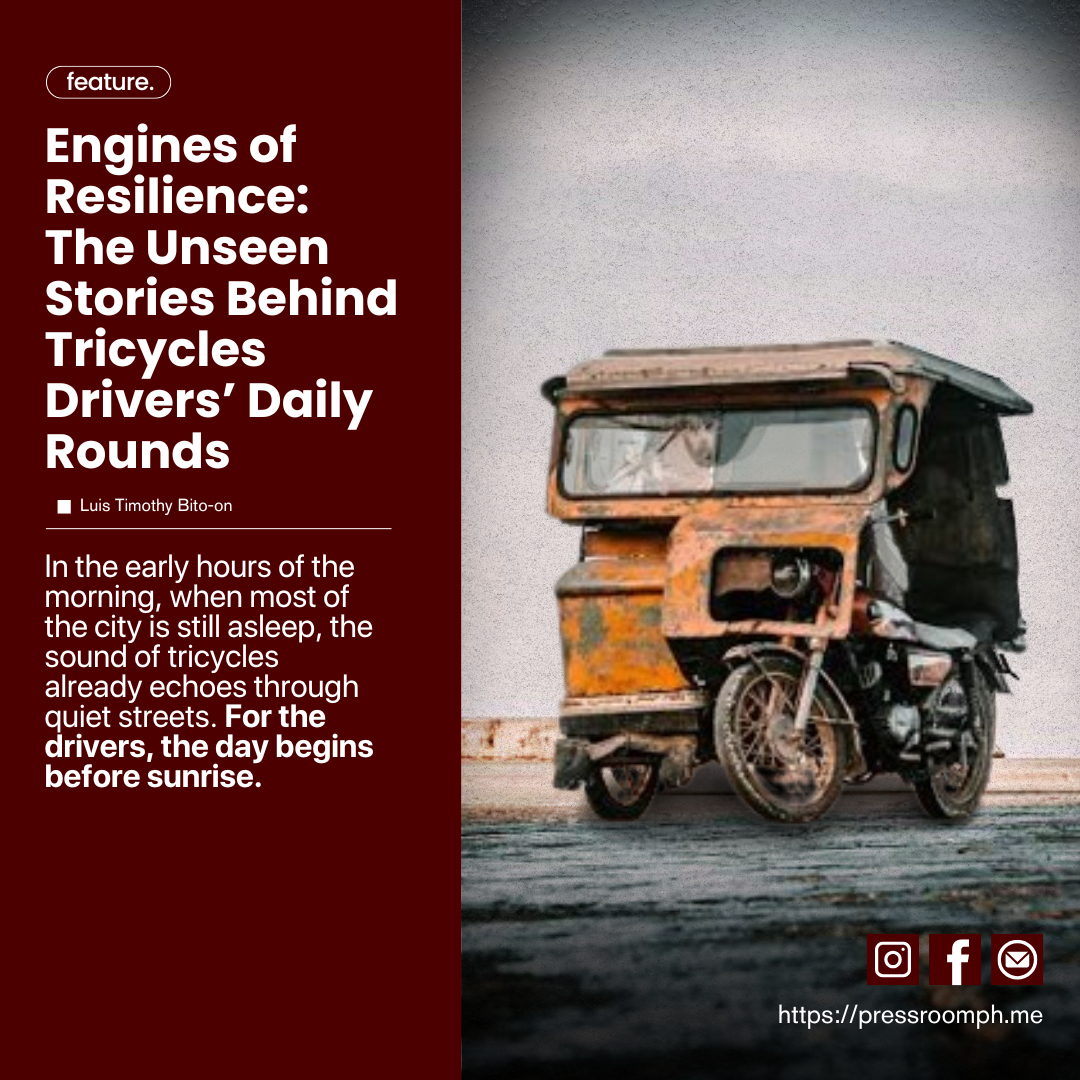
In the early hours of the morning, when most of the city is still asleep, the sound of tricycles already echoes through quiet streets. For the drivers, the day begins before sunrise. Engines are checked, tires are inspected, and fuel is measured sparingly before they set off to the nearest terminal.

Lahat nagbabago, walang permanente, walang nananatili. Kahit anong pilit na pigilan ang pagtakbo ng oras, hindi ito nakikiusap, lalo na kung lumipas na. Hindi na natin ito mababalikan.
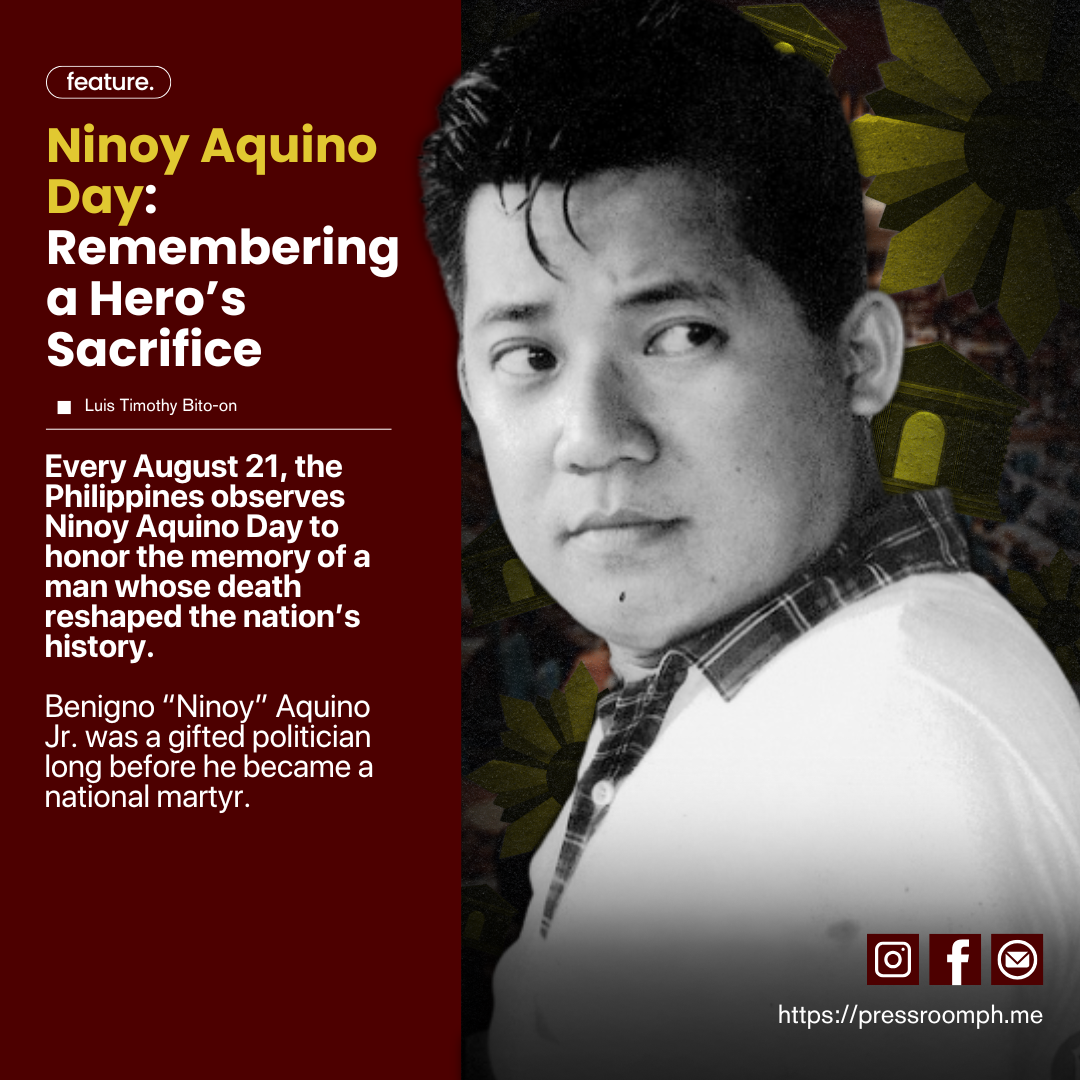
Benigno “Ninoy” Aquino Jr. was a gifted politician long before he became a national martyr. He served as the youngest governor of Tarlac. At just 35, he was elected as the youngest senator of the Republic, known for his eloquence, wit, and sharp criticisms of government abuses.
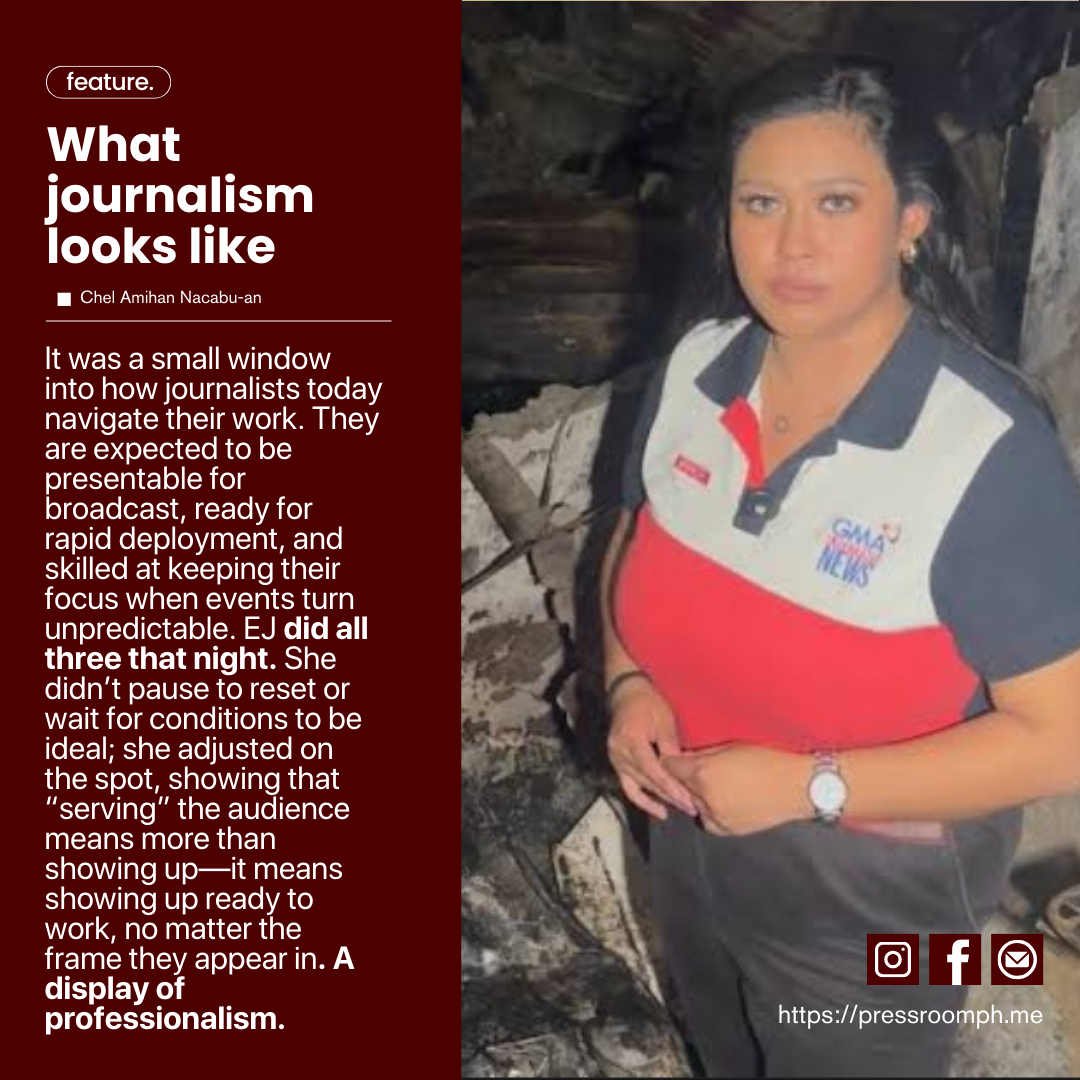
There was the viral origin of her reputation: a news anchor delivering storm-ravaged updates with perfect makeup intact. The internet dubbed her the “mystery setting spray girl.” It was funny, fleeting, a meme.
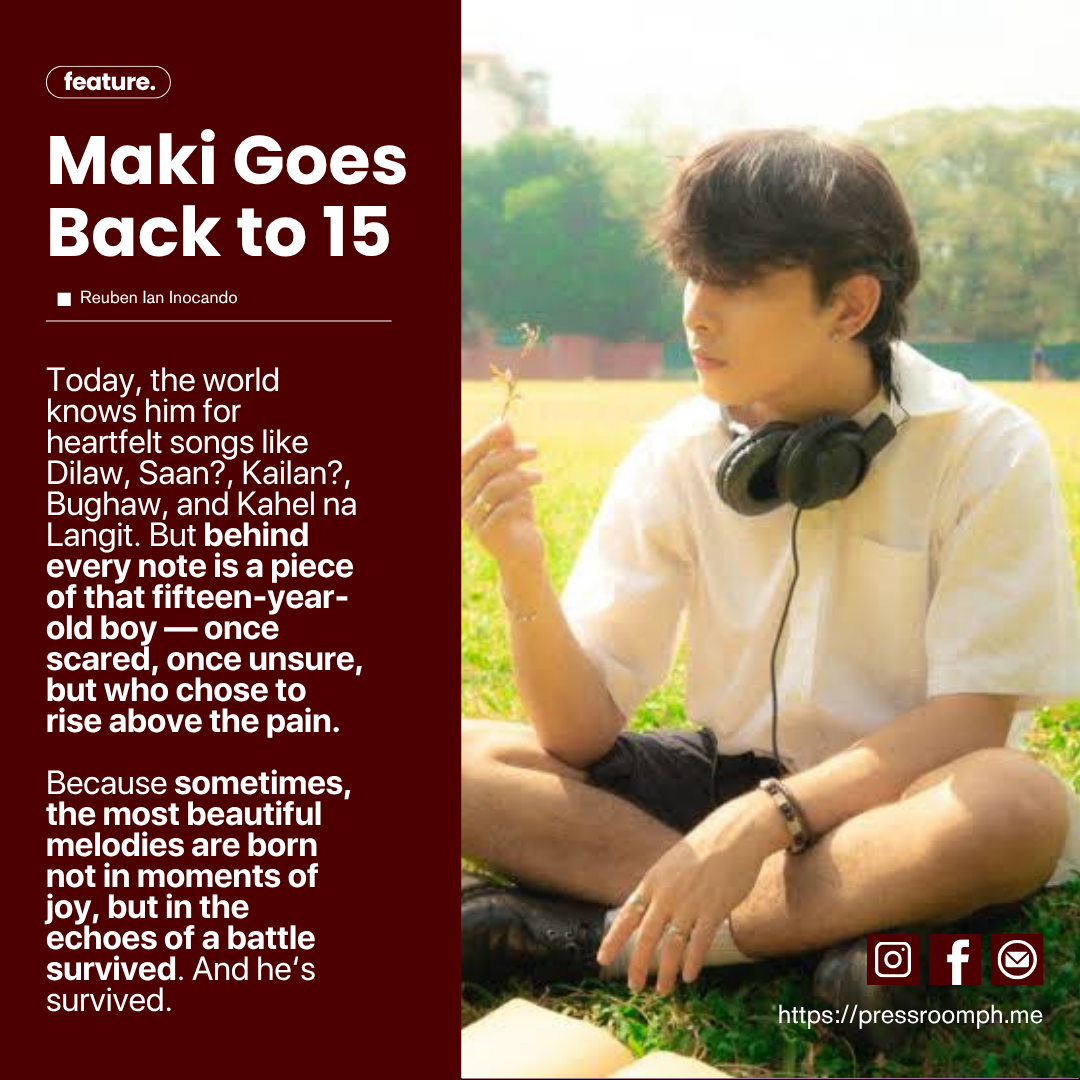
Under the glow of studio lights, Maki Robredo now stands as one of OPM’s most promising voices — his songs weaving color into the lives of those who listen. But long before the fame, there was a day when the stage felt like a dangerous place. At just fifteen, in the prime of his innocence and passion, he stepped into an audition that would leave him shaken, questioning not only his dream but also his place in the world he longed to enter.
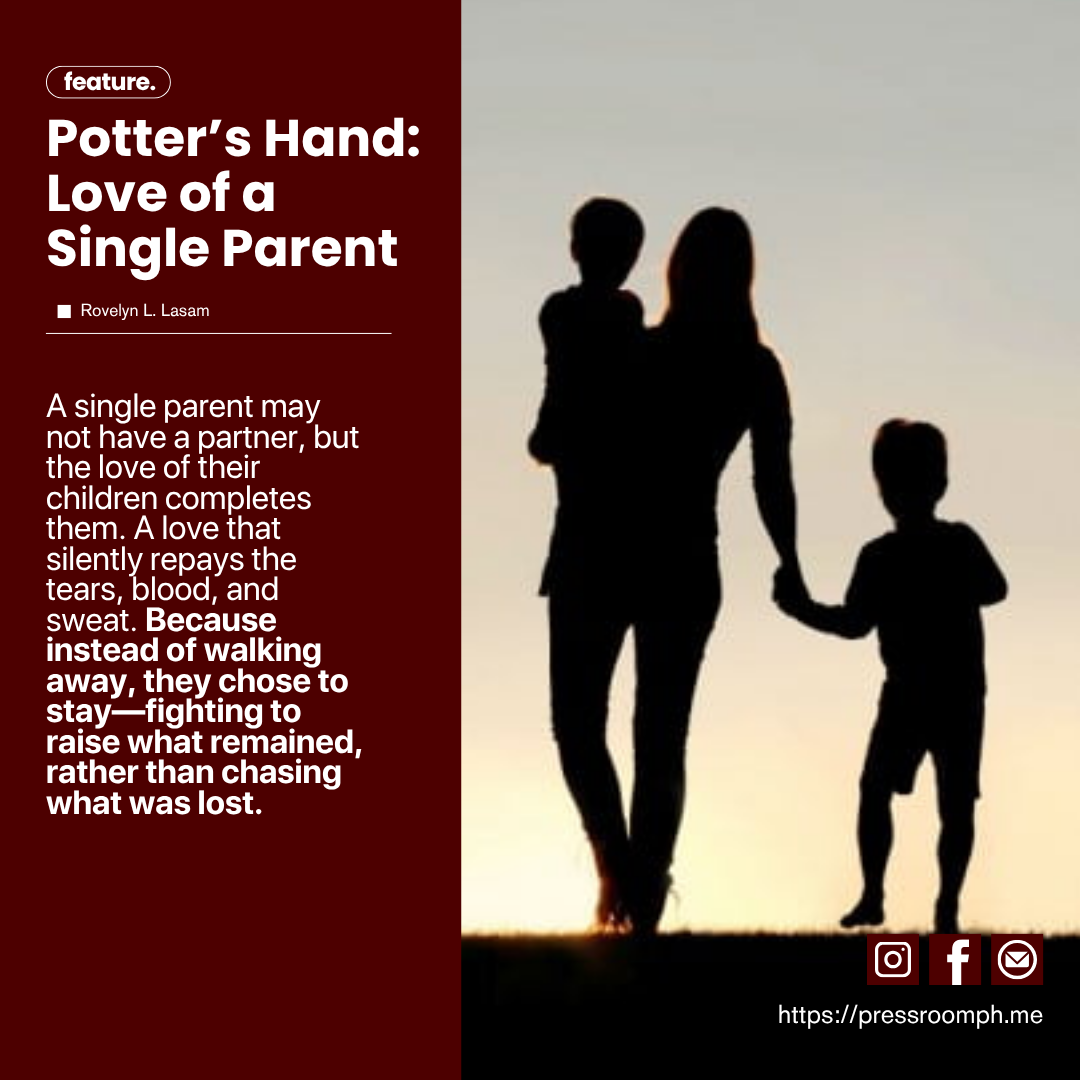
In order to become a good masterpiece, we need hands—gentle, firm, and enduring hands—to mold us into a beautiful work of art.

There are days when you scroll through an old photo and barely recognize the person smiling back at you. Not because they look so different—but because you remember who you were when that photo was taken. Your habits, your voice, your dreams—the way you moved through the world.
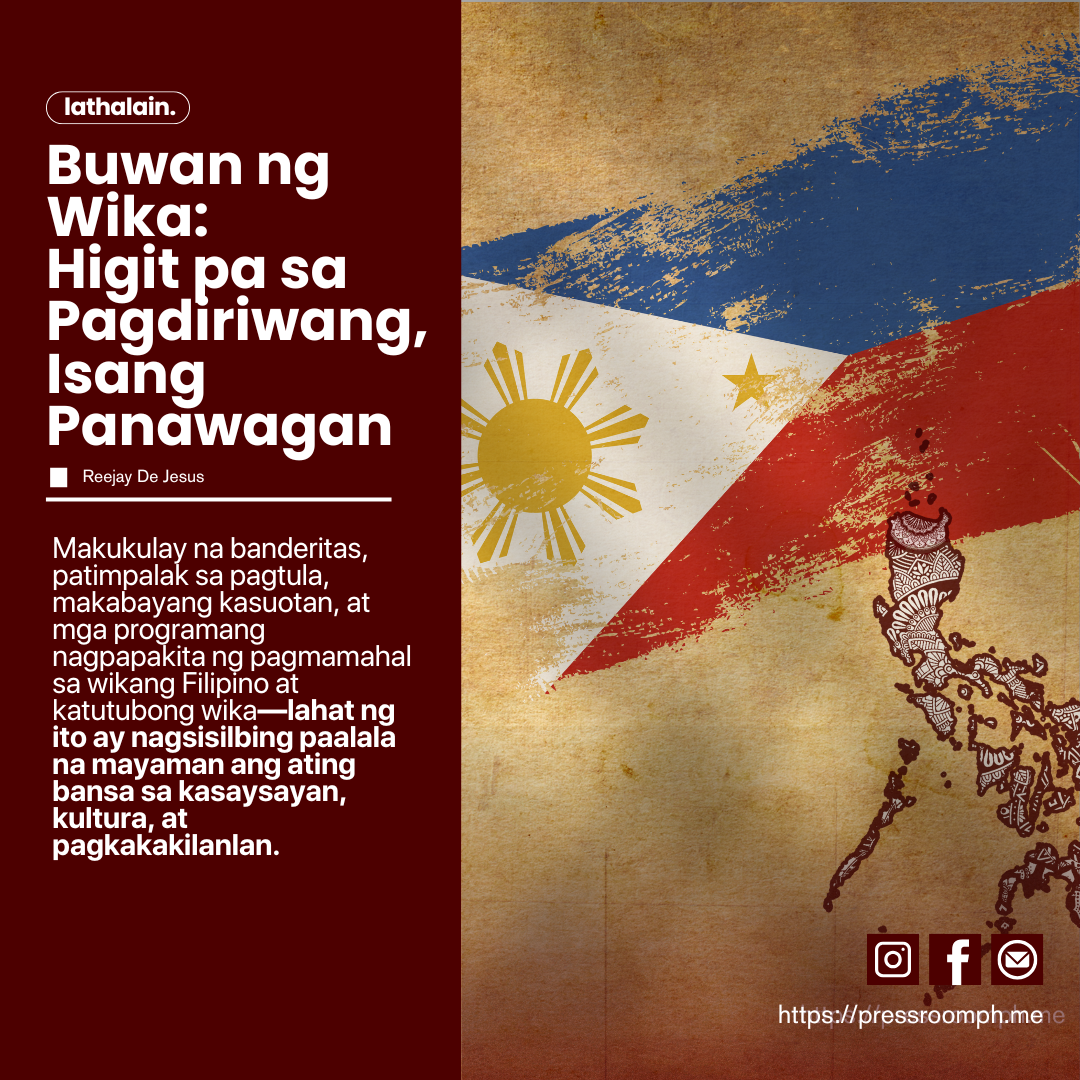
Tuwing sasapit ang buwan ng Agosto, tila muling bumabalik ang sigla ng mga paaralan, komunidad, at institusyon sa pagyakap sa sariling wika. Makukulay na banderitas, patimpalak sa pagtula, makabayang kasuotan, at mga programang nagpapakita ng pagmamahal sa wikang Filipino at katutubong wika—lahat ng ito ay nagsisilbing paalala na mayaman ang ating bansa sa kasaysayan, kultura, at pagkakakilanlan.

“Matatapang, Matatalino, walang takot kahit kanino, hinding hindi magpapahuli.” These words are more than just a cheer; it is the identity of every Isko and Iska. But being able to cheer this chant and embody it is no easy task – to go through the eye of the needle, survive the one of the hardest entrance exams in the country.
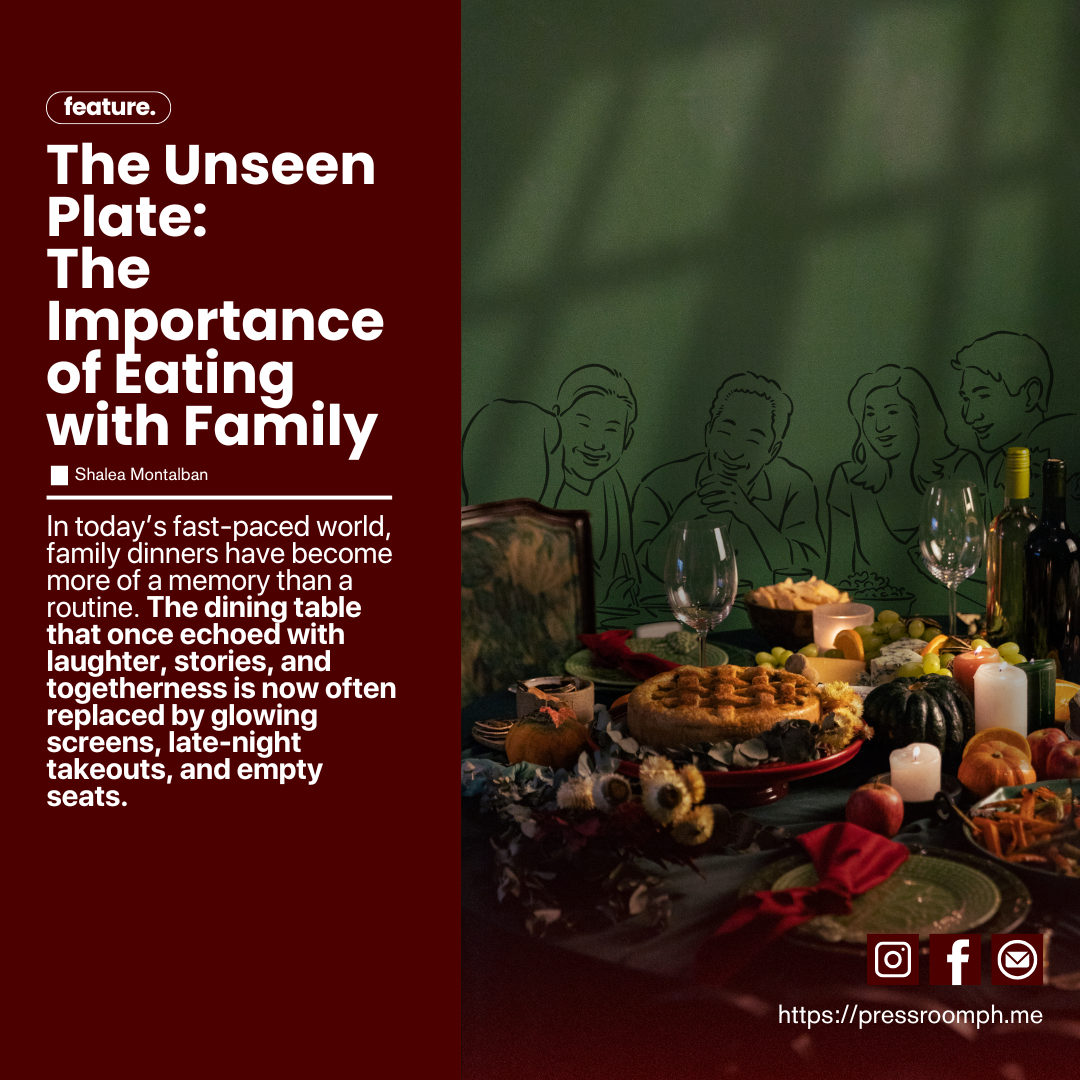
In today’s fast-paced world, family dinners have become more of a memory than a routine. The dining table that once echoed with laughter, stories, and togetherness is now often replaced by glowing screens, late-night takeouts, and empty seats.

From the moment the spotlight hits the last two standing, holding their hands and the crowds hoot down, Filipinos everywhere hold their breath in unison. And as the stadium echoed with the call "Philippines!", expect a grand celebration, for this victory is not just for the winner but for the entire archipelago.
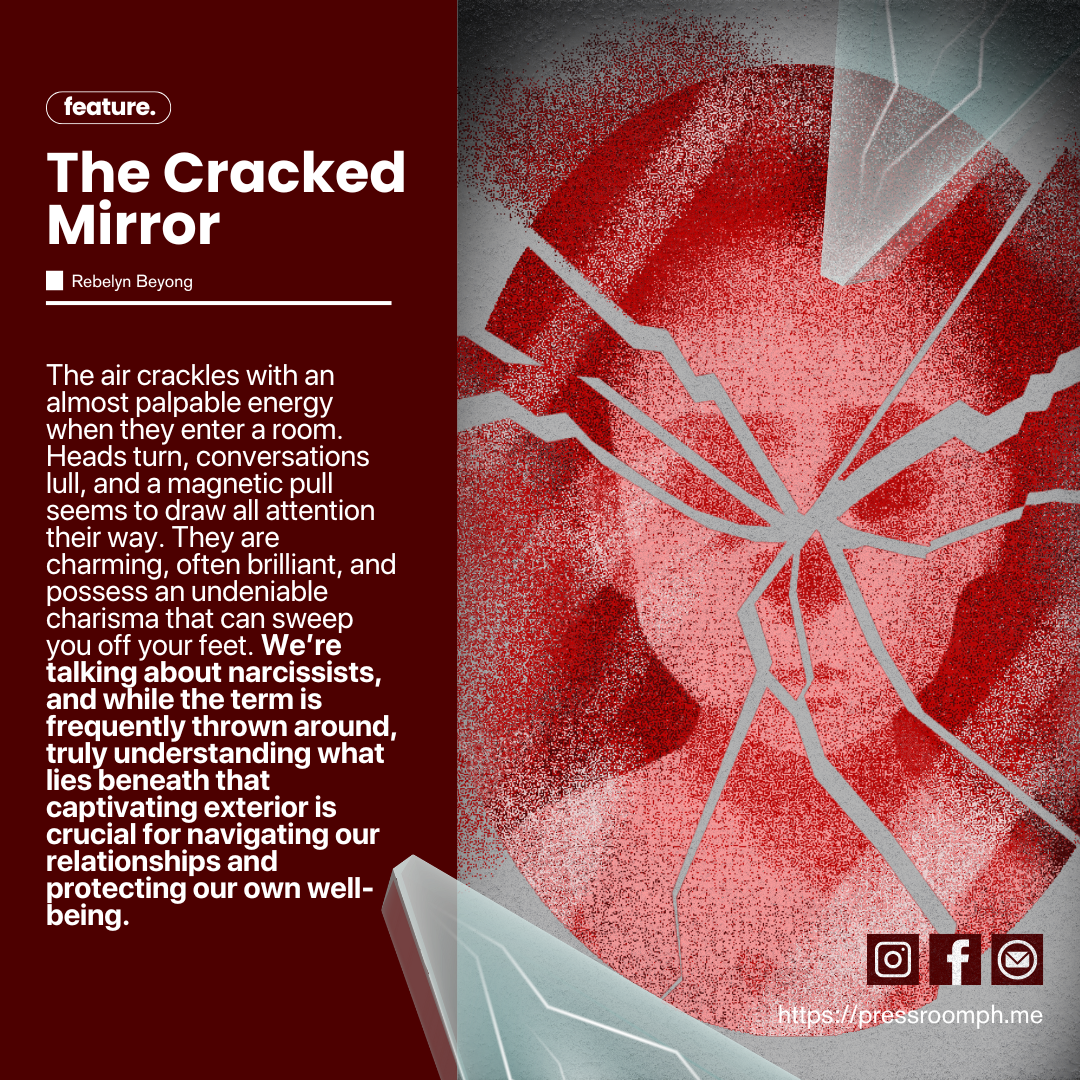
The air crackles with an almost palpable energy when they enter a room. Heads turn, conversations lull, and a magnetic pull seems to draw all attention their way. They are charming, often brilliant, and possess an undeniable charisma that can sweep you off your feet. We’re talking about narcissists, and while the term is frequently thrown around, truly understanding what lies beneath that captivating exterior is crucial for navigating our relationships and protecting our own well-being.
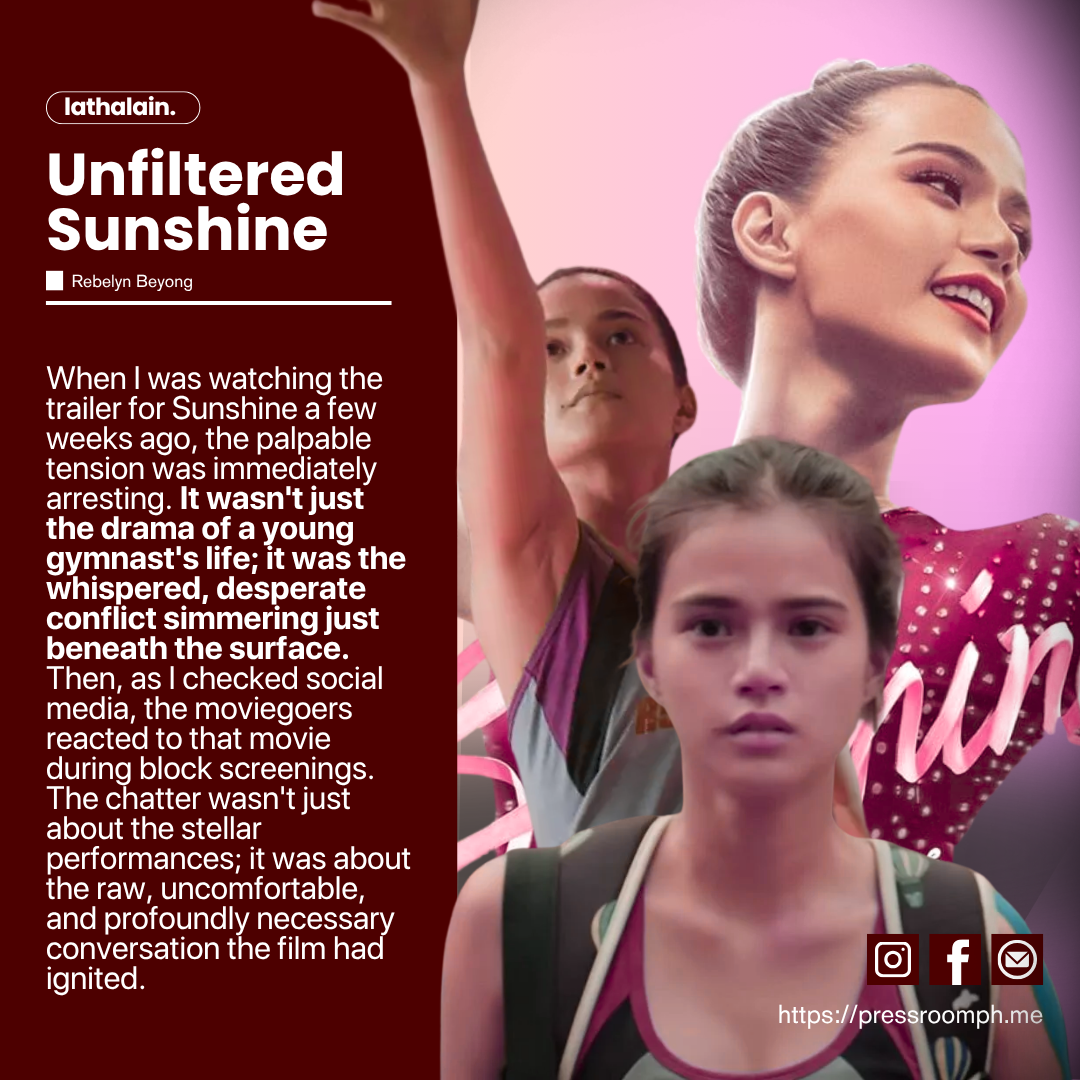
When I was watching the trailer for Sunshine a few weeks ago, the palpable tension was immediately arresting. It wasn't just the drama of a young gymnast's life; it was the whispered, desperate conflict simmering just beneath the surface. Then, as I checked social media, the moviegoers reacted to that movie during block screenings. The chatter wasn't just about the stellar performances; it was about the raw, uncomfortable, and profoundly necessary conversation the film had ignited.
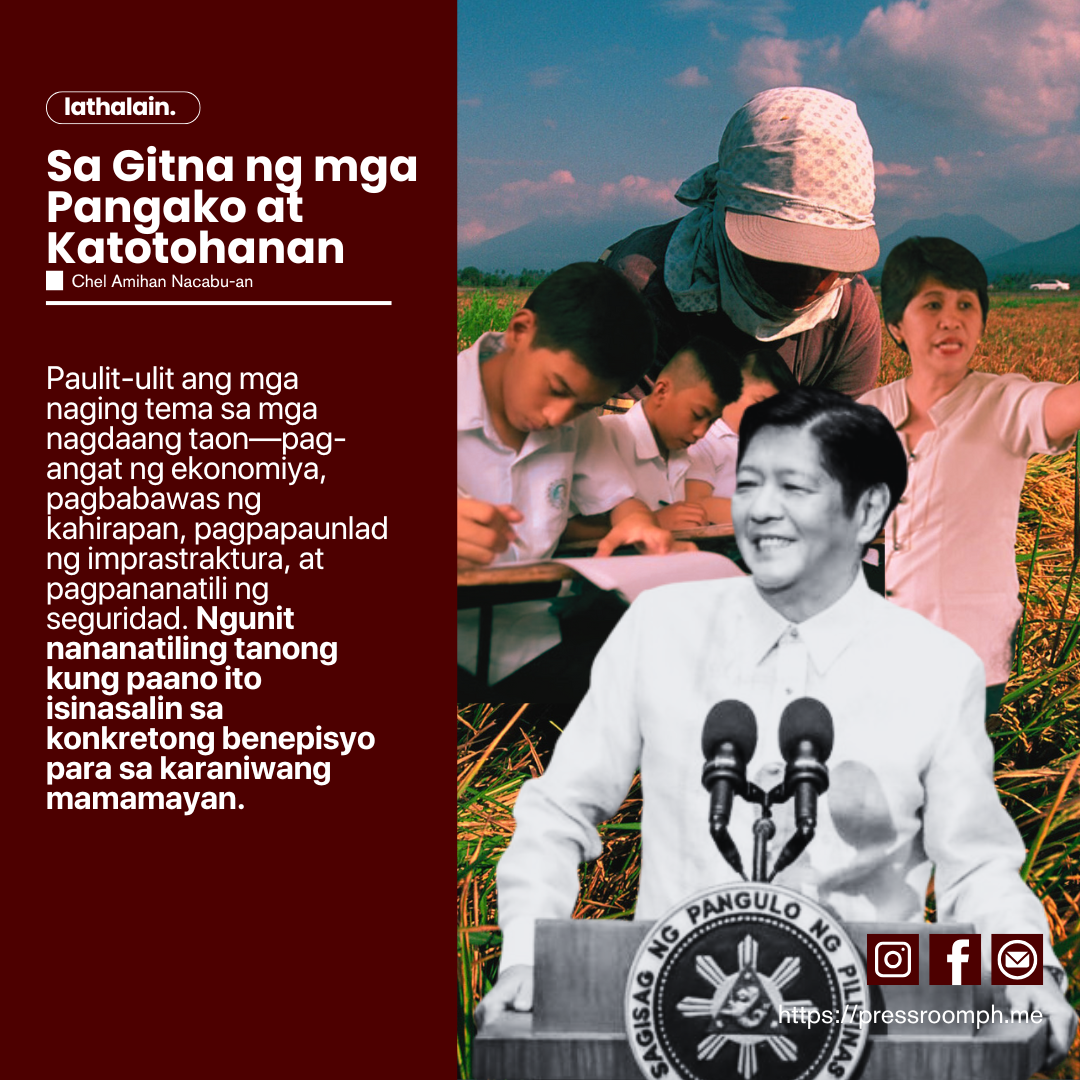
Bawat pag-ikot ng taon, muling hinahabi ang naratibo ng ating bansa sa isang talumpating inaabangan, pinag-uusapan, at kinukuwestyon—ang State of the Nation Address o SONA. Ito ang yugto kung saan ang lider ng bayan ay muling humaharap sa sambayanan, bitbit ang mga kwento ng pagsusumikap, tagumpay, at mga balak landasin. Ngunit sa likod ng magagarbong salita at pulidong presentasyon, naroon ang tanong na hindi madaling sagutin: hanggang saan nga ba ang agwat ng pangako sa katotohanan?
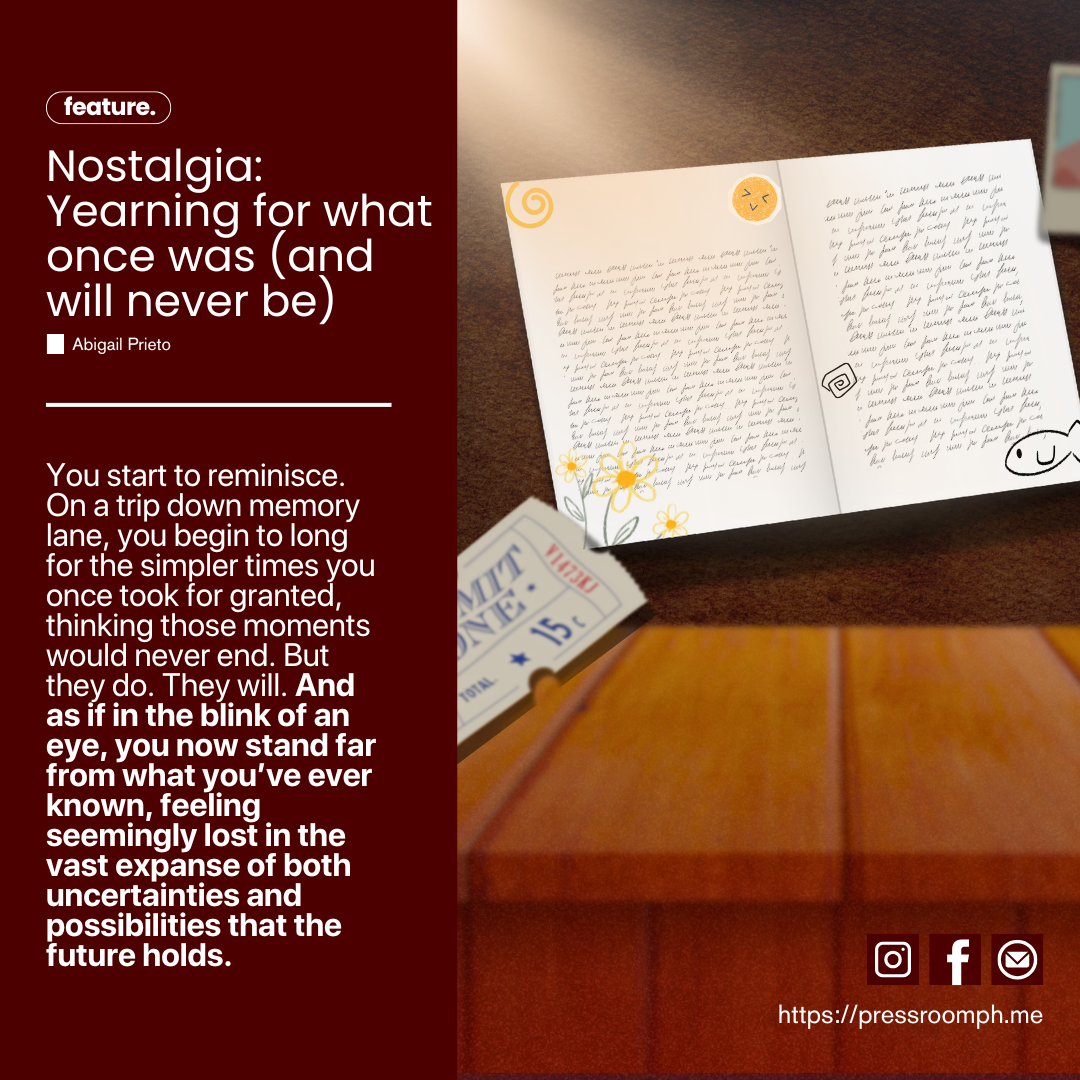
It’s been one week since the end of your academic calendar. You start to pack your things in the dorm you’ve been renting for three years now, ready to go home and maybe rest a little if time and circumstances permit. As you rummage through all your belongings, deciding which items to bring home, you come across an old notebook you’d forgotten even existed.
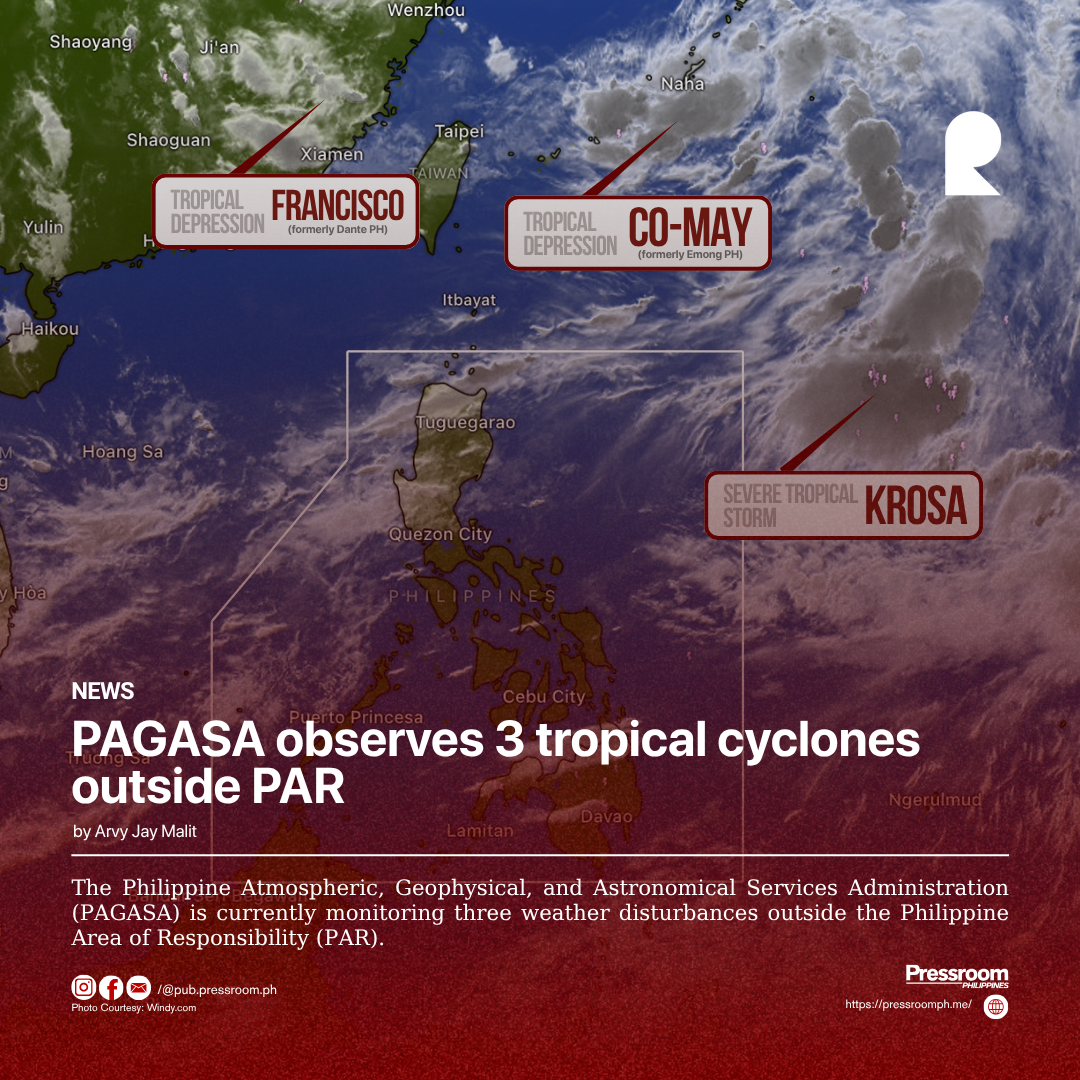
The Philippine Atmospheric, Geophysical, and Astronomical Services Administration (PAGASA) is currently monitoring three weather disturbances outside the Philippine Area of Responsibility (PAR).

“Nangako siya.” Iyon ang pinanghawakan ng marami. Iyon ang pinaniwalaan ng mga tagahangang mula umpisa’y nandoon na sumubaybay sa bawat update, naghintay sa bawat chapter, nagbunyi sa bawat kilig ng I Love Since 1892. At higit sa lahat, iyon ang pangakong inukit ni Binibining Mia mismo na kapag hindi MarNella, huwag na lang.
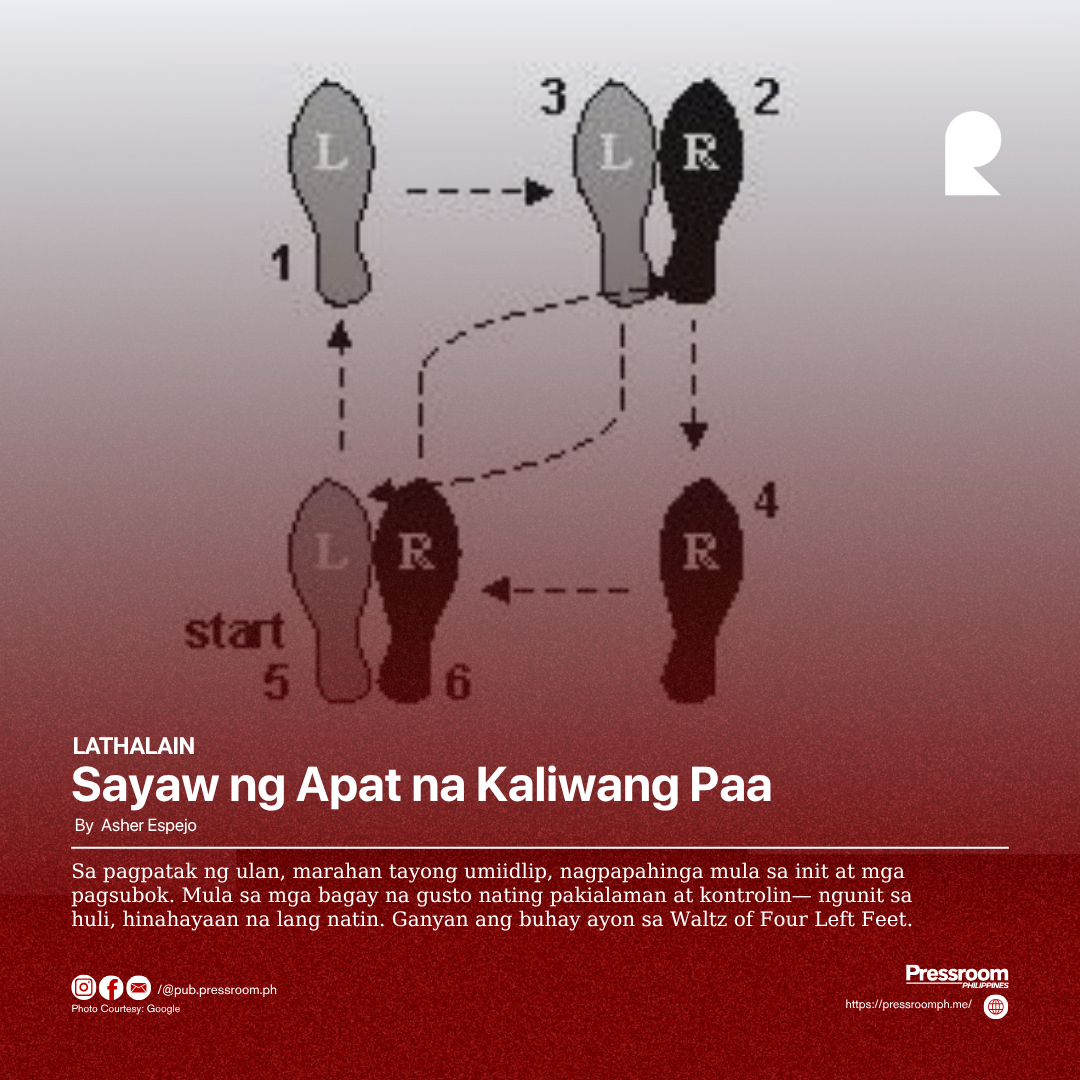
Sa pagpatak ng ulan, marahan tayong umiidlip, nagpapahinga mula sa init at mga pagsubok. Mula sa mga bagay na gusto nating pakialaman at kontrolin— ngunit sa huli, hinahayaan na lang natin. Ganyan ang buhay ayon sa Waltz of Four Left Feet.

Sa panahong ginagawang aliwan ang kasinungalingan at tahimik ang karamihan sa harap ng katiwalian, may iilan pa ring tumitindig, hindi para sumikat, kundi para sumalungat. Sila ang mga mamamahayag. Mga tinig na hindi binabayaran ng pag-oo, kundi pinapalakas ng pagtanggi. Hindi sila santo. Hindi rin sila perpekto.

Ilang bagyo na ang dumaan, lubog pa rin ang mamamayan. Ngunit bakit patuloy na yumayaman ang mga mayayaman?
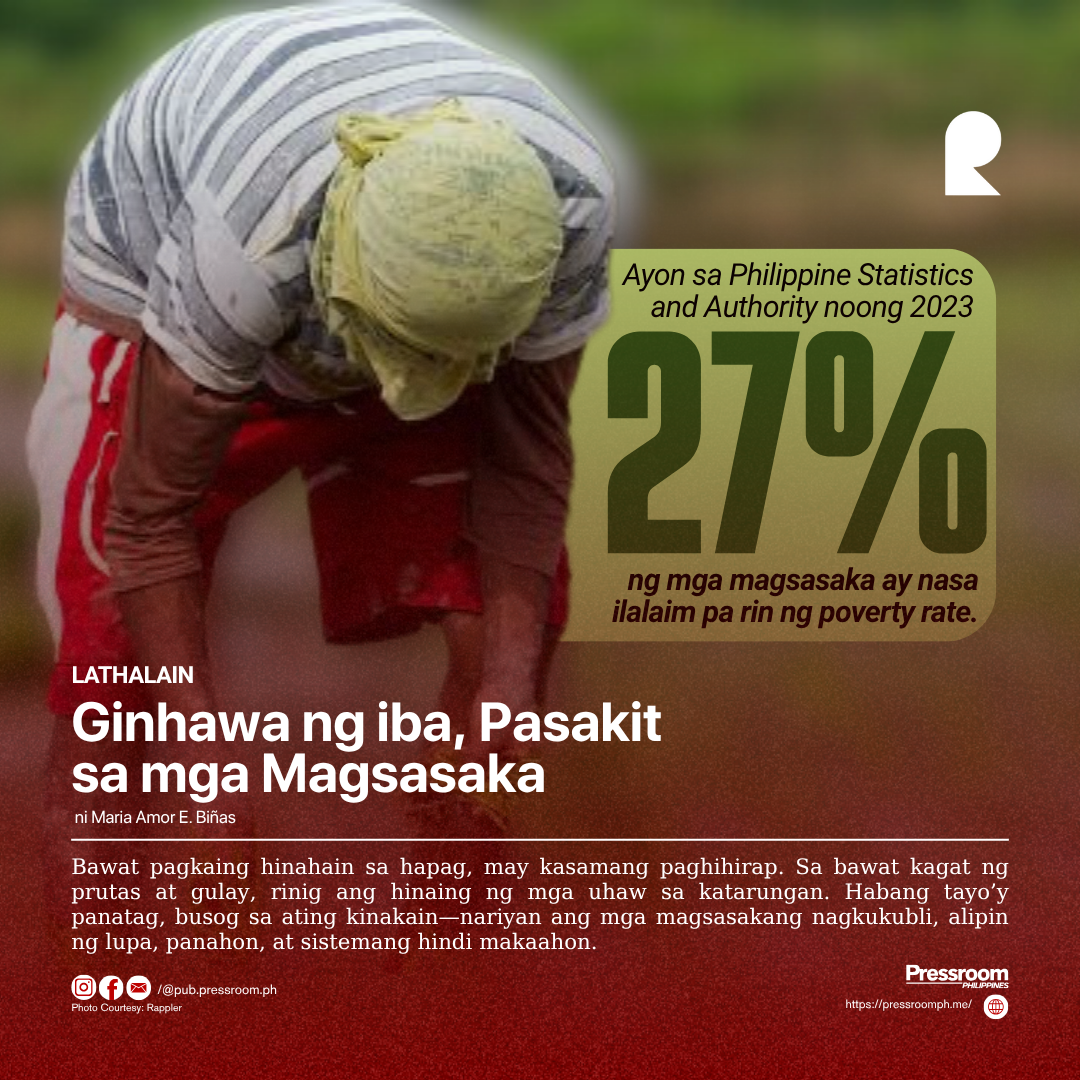
Bawat pagkaing hinahain sa hapag, may kasamang paghihirap. Sa bawat kagat ng prutas at gulay, rinig ang hinaing ng mga uhaw sa katarungan. Habang tayo’y panatag, busog sa ating kinakain—nariyan ang mga magsasakang nagkukubli, alipin ng lupa, panahon, at sistemang hindi makaahon.
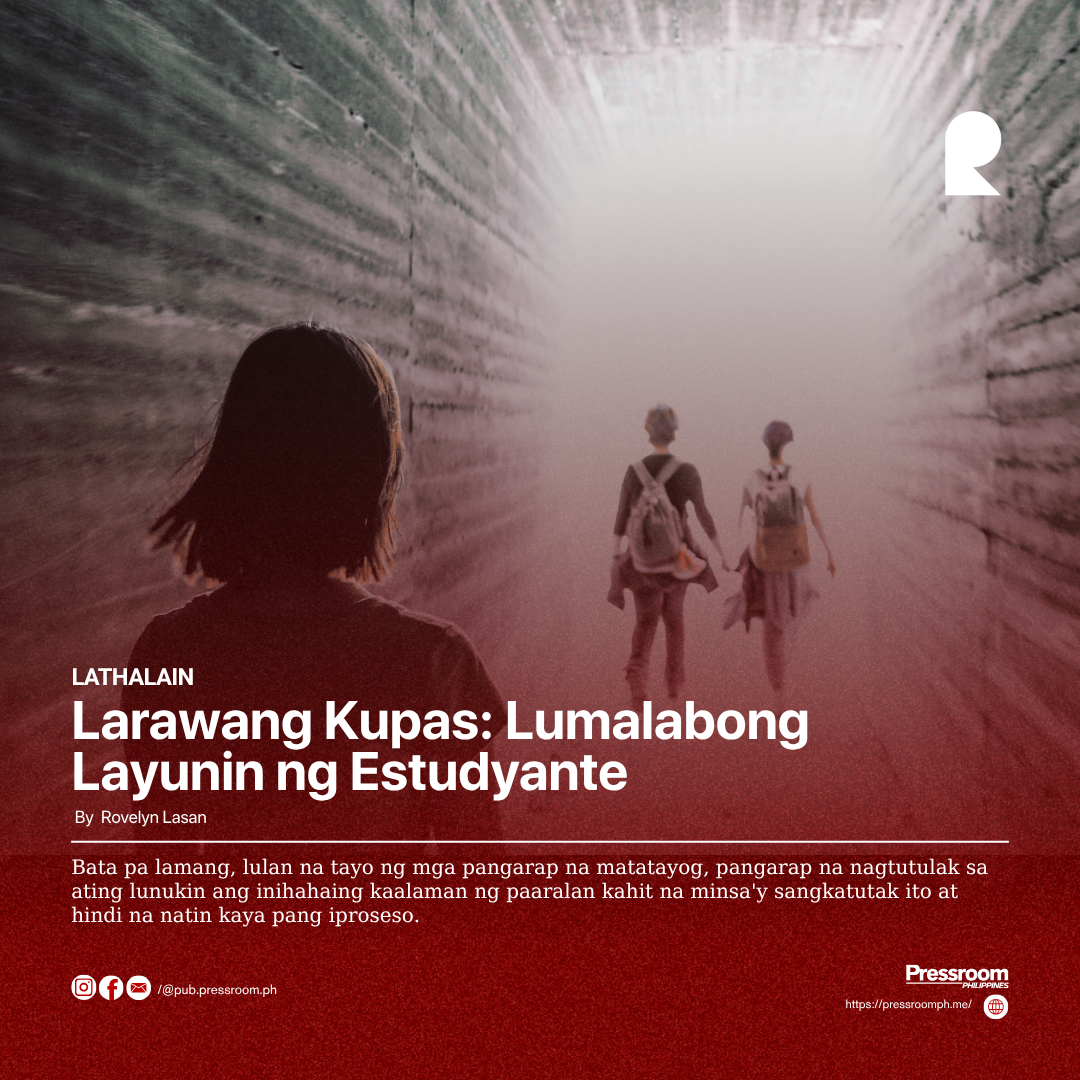
Bata pa lamang, lulan na tayo ng mga pangarap na matatayog, pangarap na nagtutulak sa ating lunukin ang inihahaing kaalaman ng paaralan kahit na minsa'y sangkatutak ito at hindi na natin kaya pang iproseso.
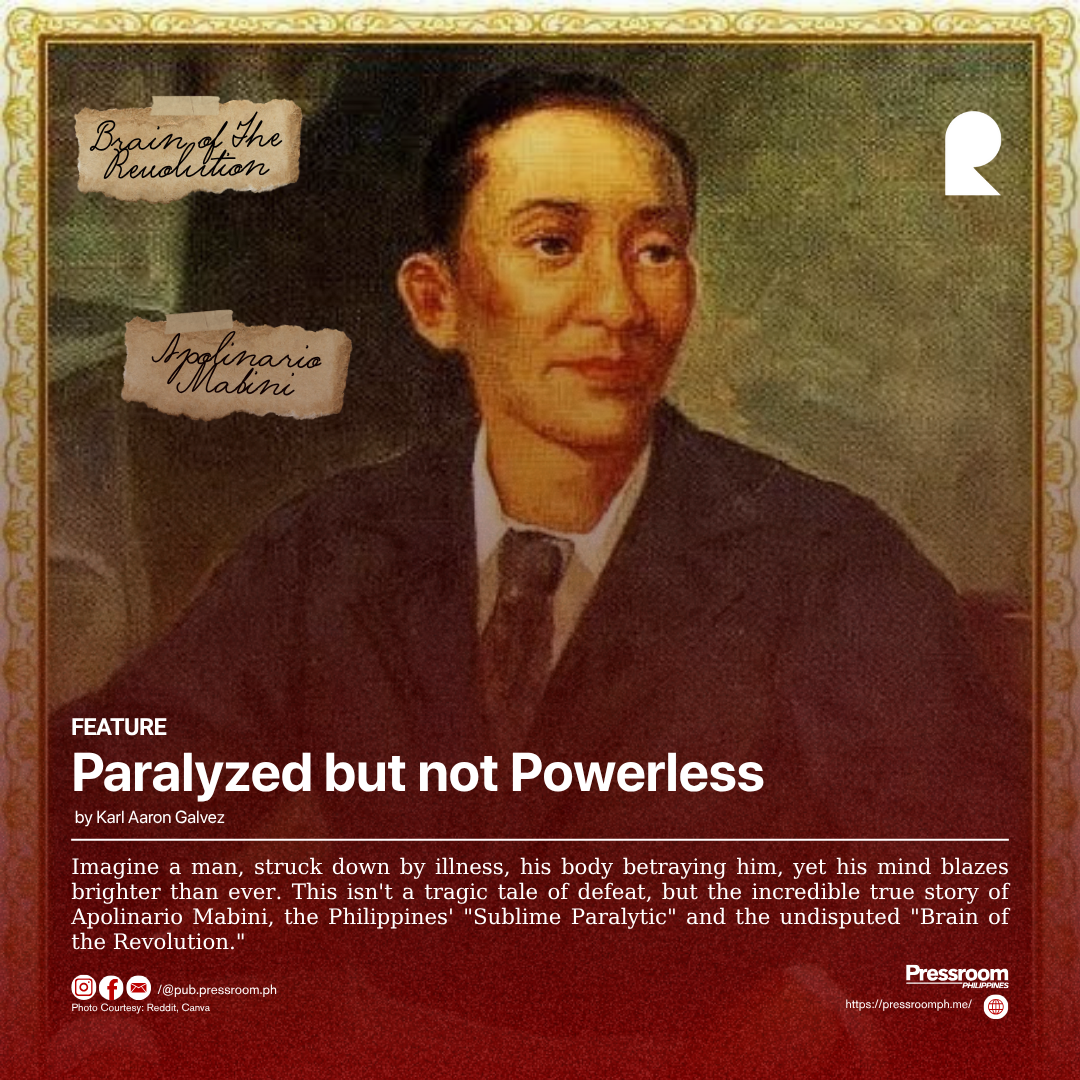
Imagine a man, struck down by illness, his body betraying him, yet his mind blazes brighter than ever. This isn't a tragic tale of defeat, but the incredible true story of Apolinario Mabini, the Philippines' "Sublime Paralytic" and the undisputed "Brain of the Revolution."
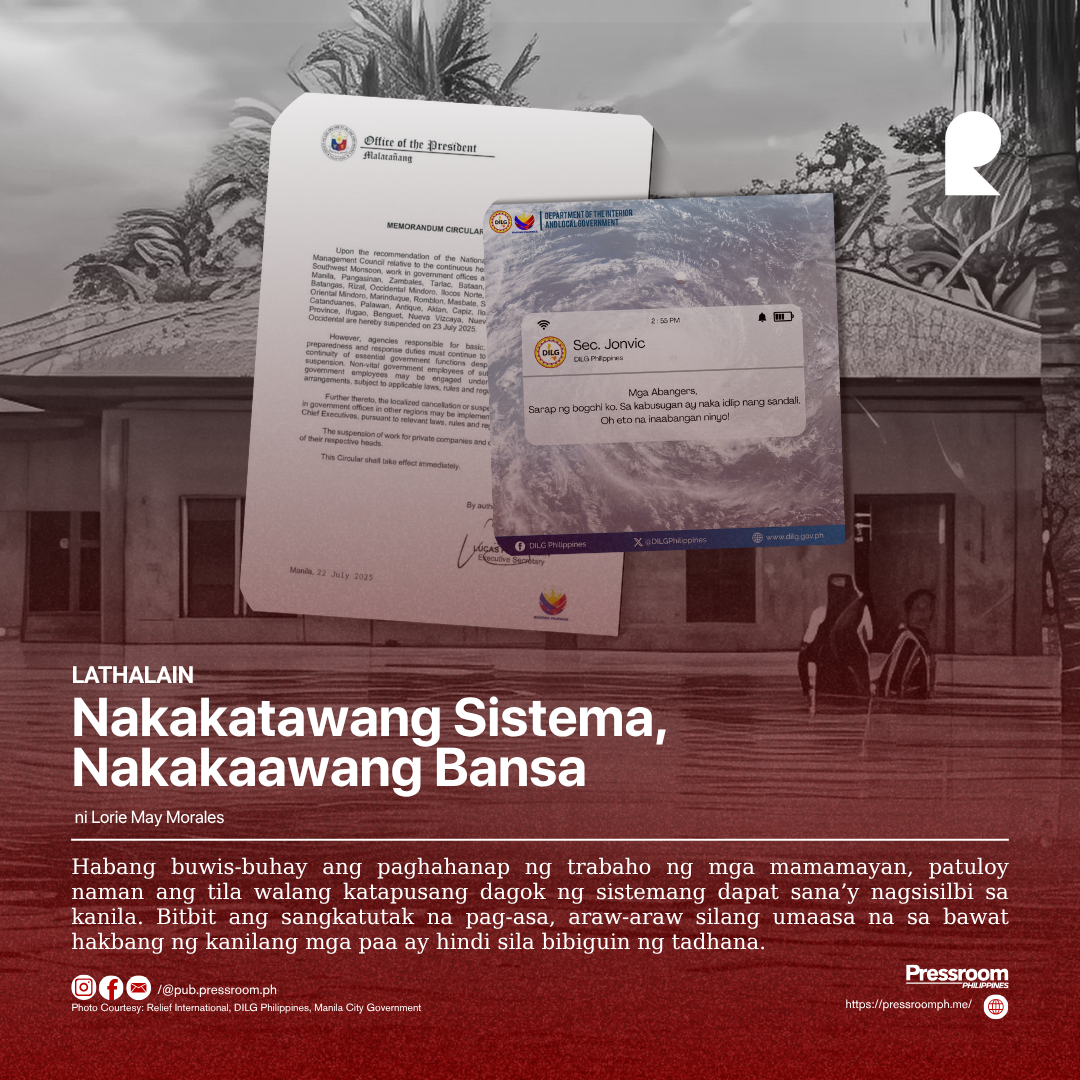
Habang buwis-buhay ang paghahanap ng trabaho ng mga mamamayan, patuloy naman ang tila walang katapusang dagok ng sistemang dapat sana’y nagsisilbi sa kanila. Bitbit ang sangkatutak na pag-asa, araw-araw silang umaasa na sa bawat hakbang ng kanilang mga paa ay hindi sila bibiguin ng tadhana.
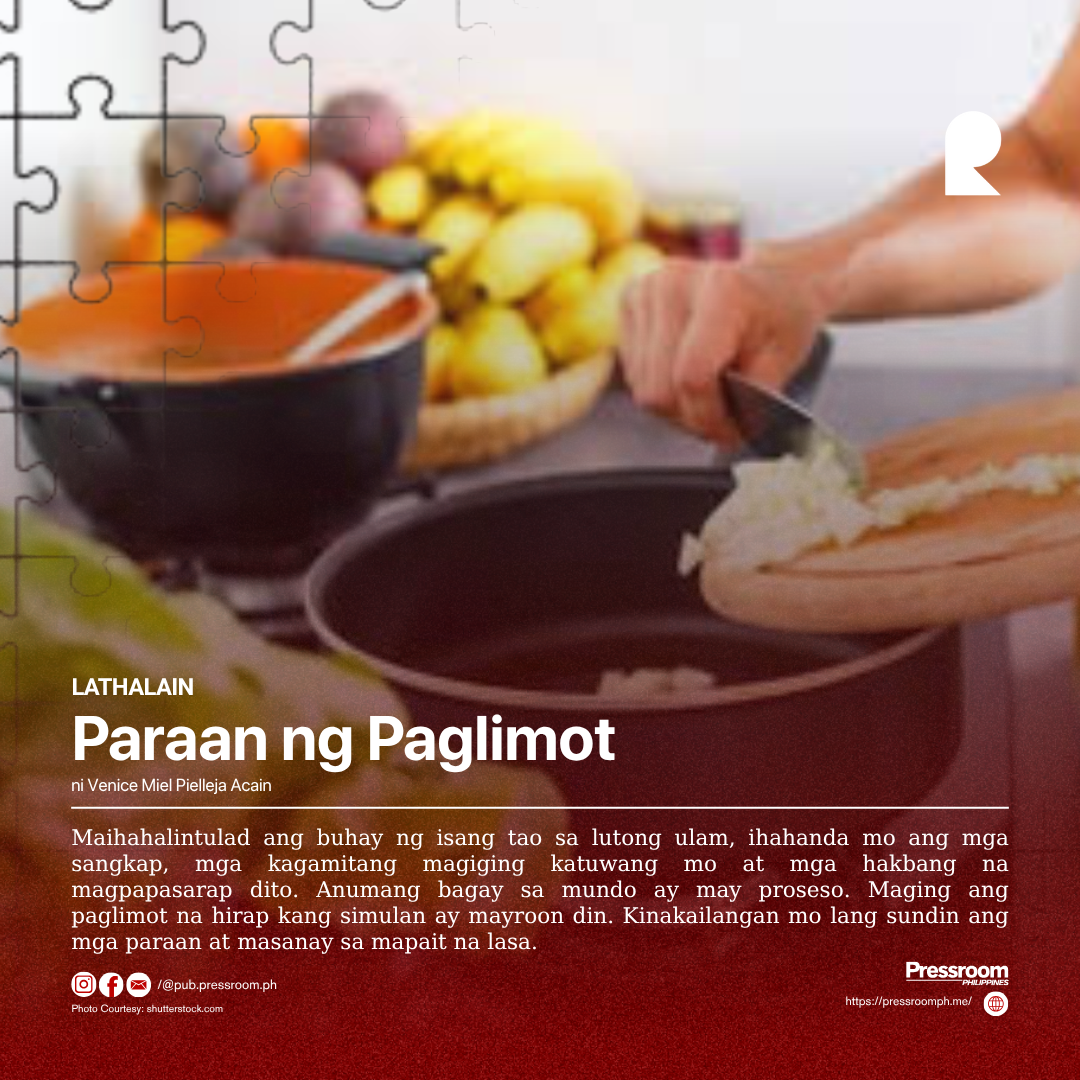
Maihahalintulad ang buhay ng isang tao sa lutong ulam, ihahanda mo ang mga sangkap, mga kagamitang magiging katuwang mo at mga hakbang na magpapasarap dito. Anumang bagay sa mundo ay may proseso. Maging ang paglimot na hirap kang simulan ay mayroon din. Kinakailangan mo lang sundin ang mga paraan at masanay sa mapait na lasa.
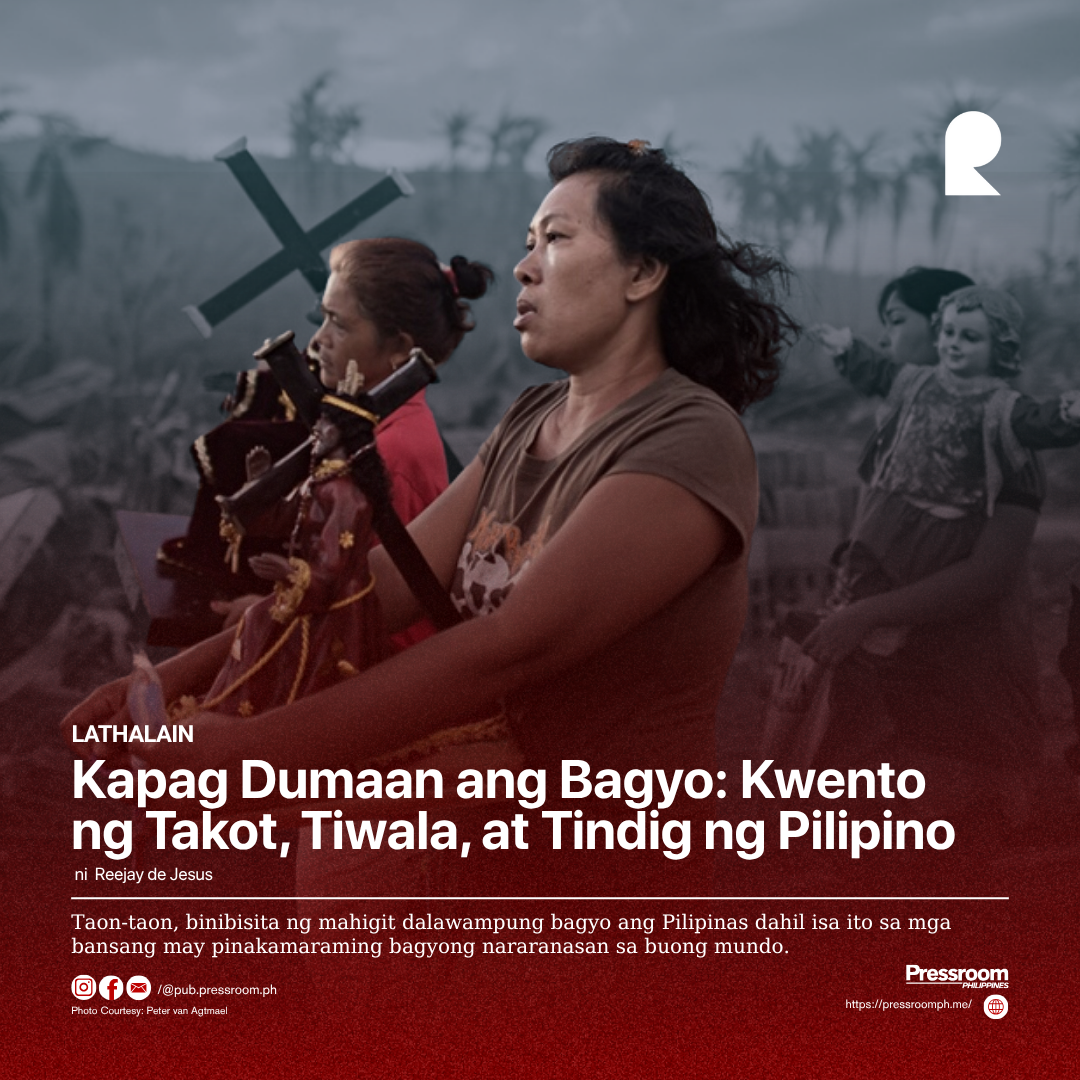
Taon-taon, binibisita ng mahigit dalawampung bagyo ang Pilipinas dahil isa ito sa mga bansang may pinakamaraming bagyong nararanasan sa buong mundo.
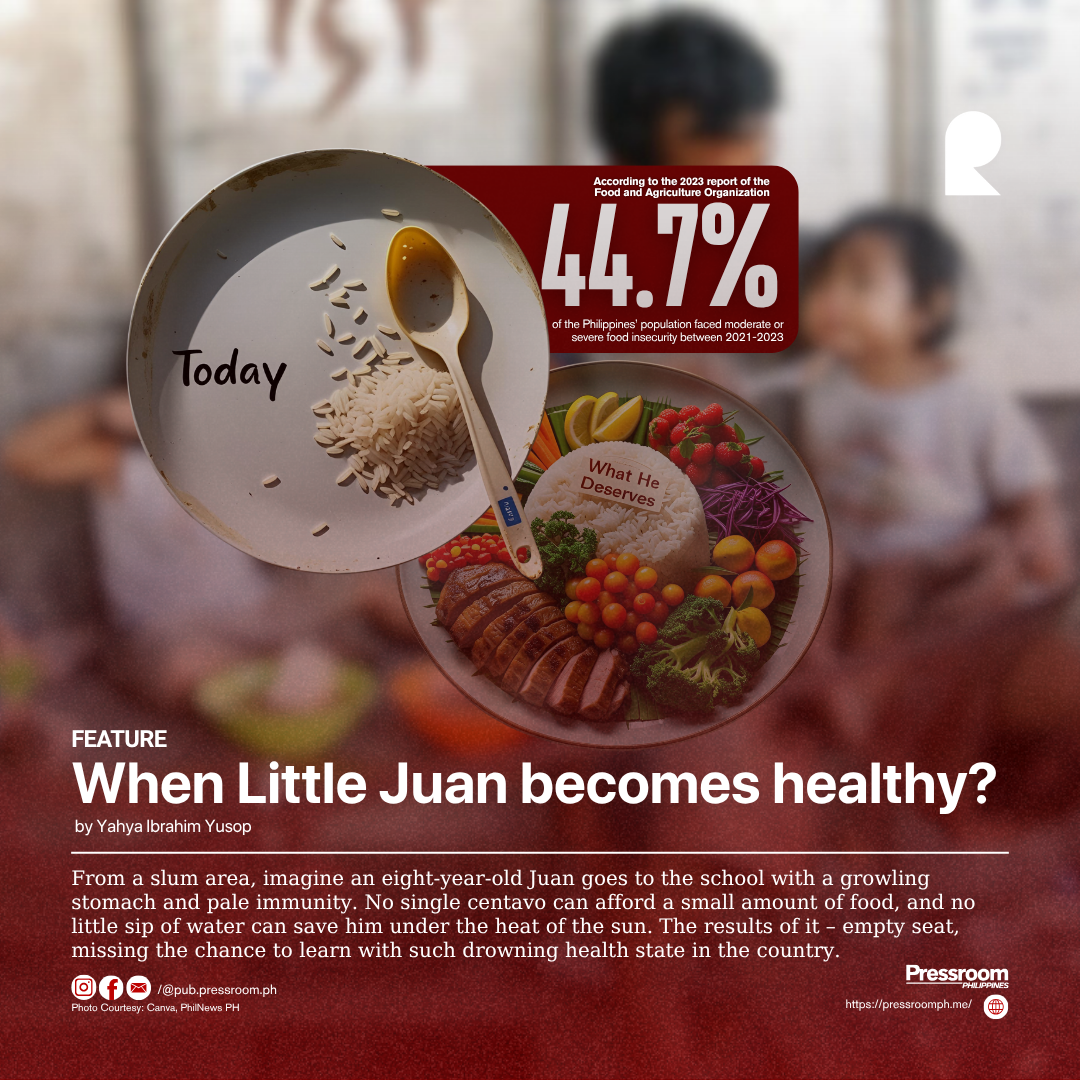
From a slum area, imagine an eight-year-old Juan goes to the school with a growling stomach and pale immunity. No single centavo can afford a small amount of food, and no little sip of water can save him under the heat of the sun.

In a world where the line between tradition and modernity often blurs, Filipino American composer and percussionist Susie Ibarra has successfully woven them together in her groundbreaking work, Sky Islands.
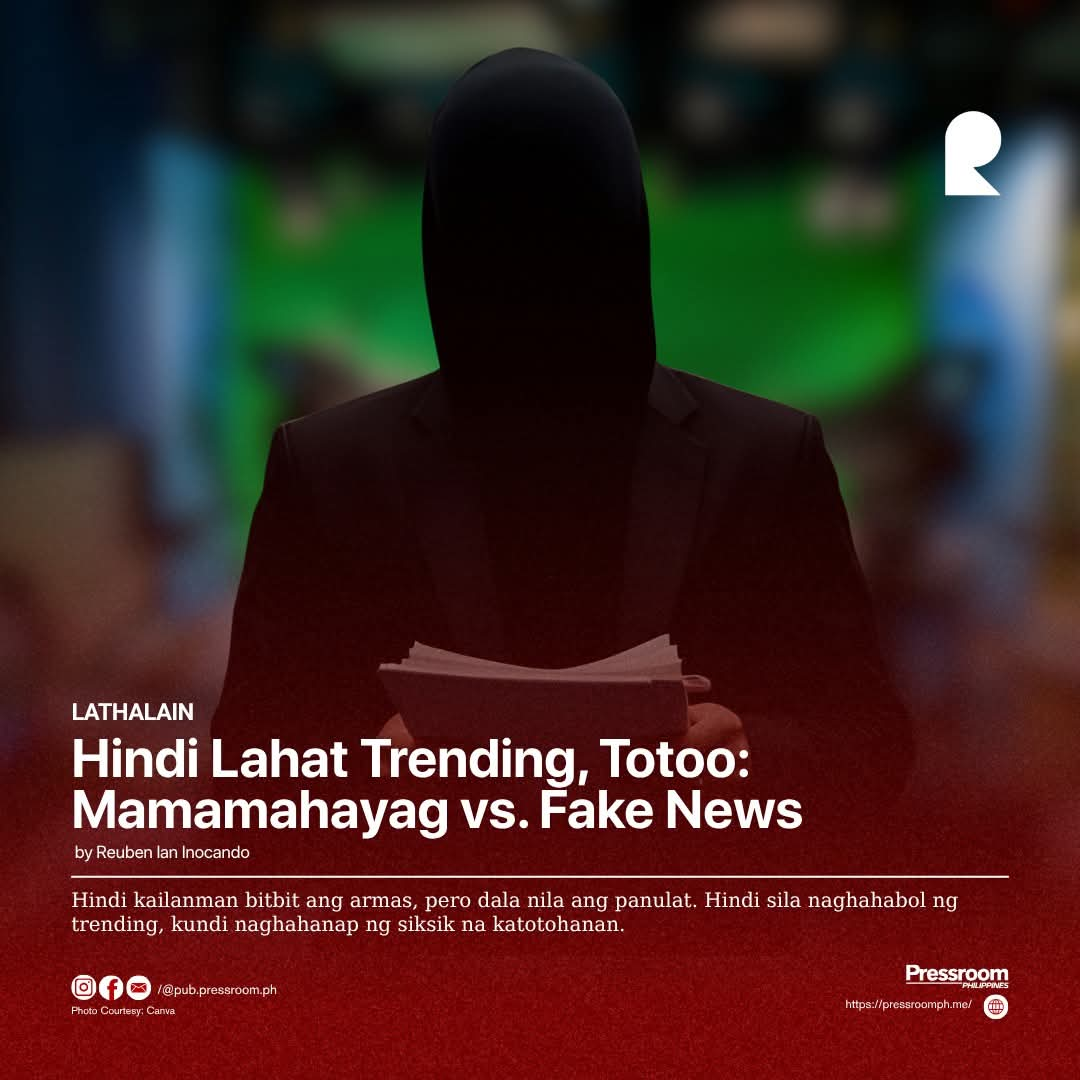
Hindi kailanman bitbit ang armas, pero dala nila ang panulat. Hindi sila naghahabol ng trending, kundi naghahanap ng siksik na katotohanan.
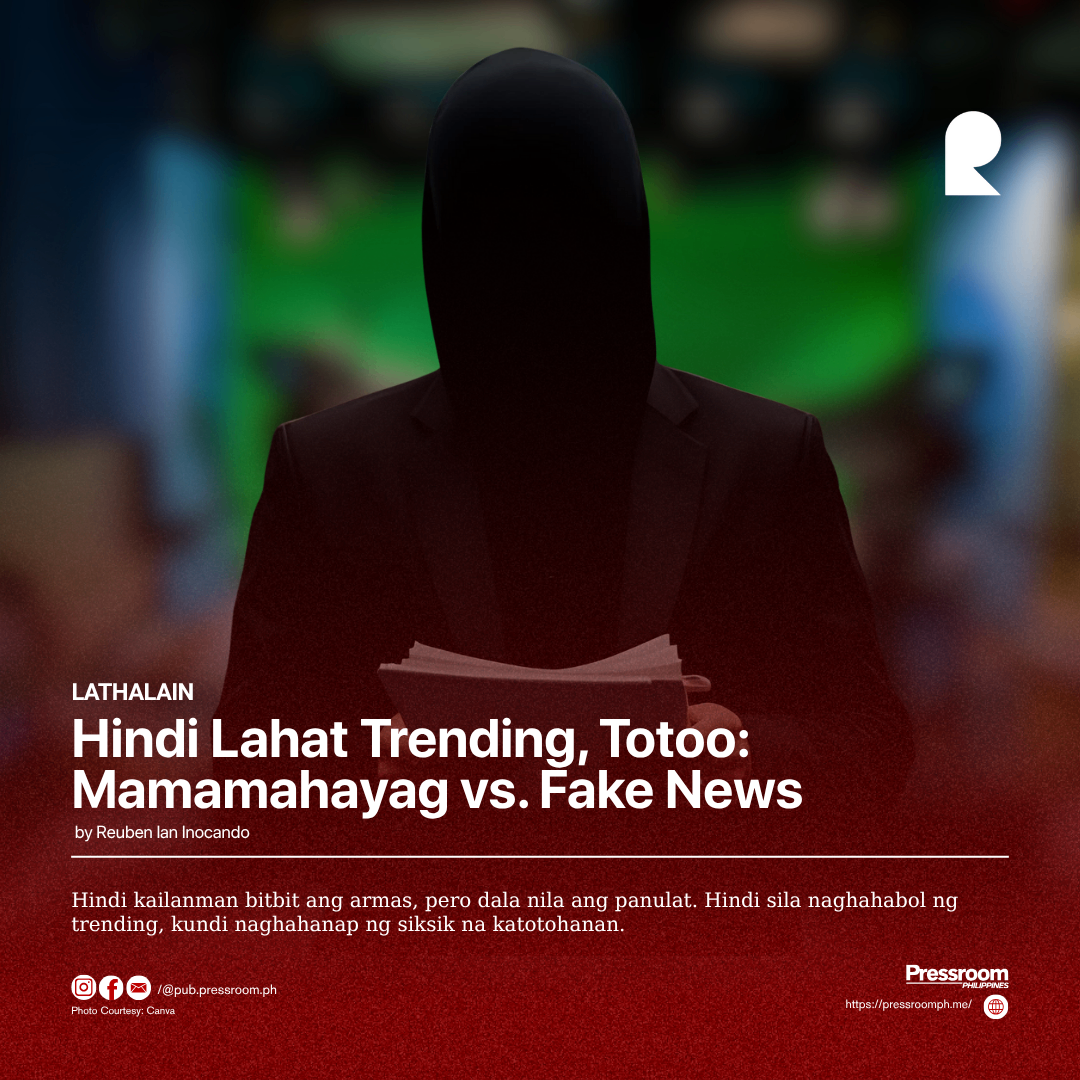
Hindi kailanman bitbit ang armas, pero dala nila ang panulat. Hindi sila naghahabol ng trending, kundi naghahanap ng siksik na katotohanan.
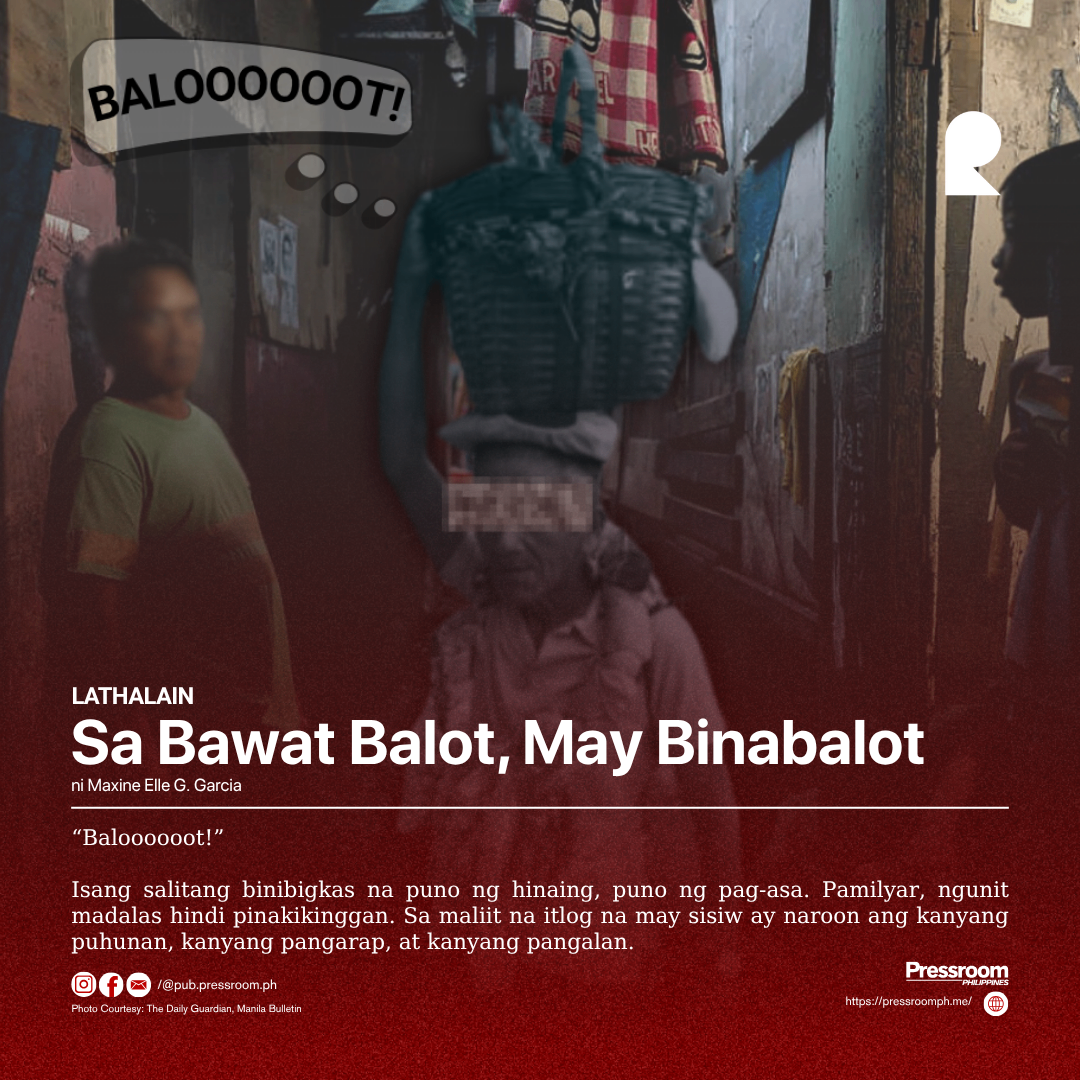
Hindi lahat ng nilulon ay dahil sa gutom. Minsan, panandaliang lunas ito sa mas malalim na sugat.

The school bell rings, but not every child hears it. In distant barangays, along city sidewalks, and inside crowded markets, many children are not holding pens or notebooks—they are gripping brooms, pushing carts, or counting coins.
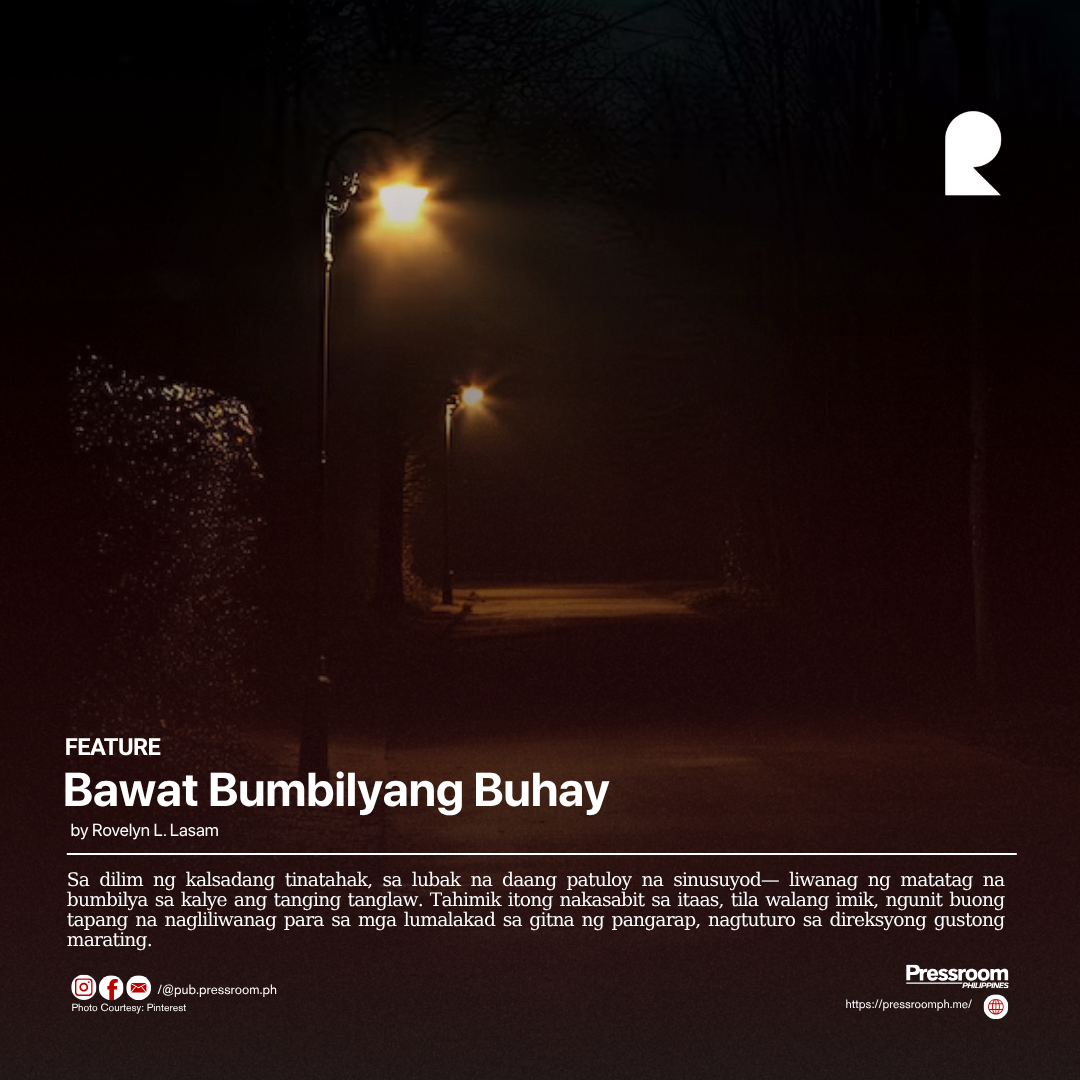
Liwanag sa daang tinatahak ng mga bagong pasahero ng kolehiyo.

A surge in crime grips the Philippines, leaving communities fearful and questioning their safety. Beyond statistics, personal stories of loss and desperation emerge. Is this a wake-up call to address deeper societal issues beyond just law enforcement?

In a blink, our world transformed. From waking up to check notifications to scrolling endlessly before sleeping, digital screens have become extensions of our very selves. Our social lives, news feeds, entertainment, and even our studies are now intertwined with the relentless hum of the internet.

When we first step into the University of the Philippines, we are taught that honor and excellence are more than just words. They are principles meant to shape our journey. These values should guide not only our academic pursuits but also our leadership, friendships, and personal relationships.

Sa isang lungsod sa Pinas, bago pa man marinig ang “tiktilaok” ng manok at bago pa bumigat ang trapiko—may isang taong lumalabas ng kanilang bahay. Bitbit ay barya lamang, iniisip kung paano ipagkakasya ang pamasahe at ulam. Samantalang sa isang opisina ng kanilang lokal na gobyerno, may pipirma na naman ng proyektong tila’y hindi na naman iplinano nang mabuti—isang papel na humahalaga ng milyon, ngunit walang silbi sa kapakanan ng mamamayan nito.
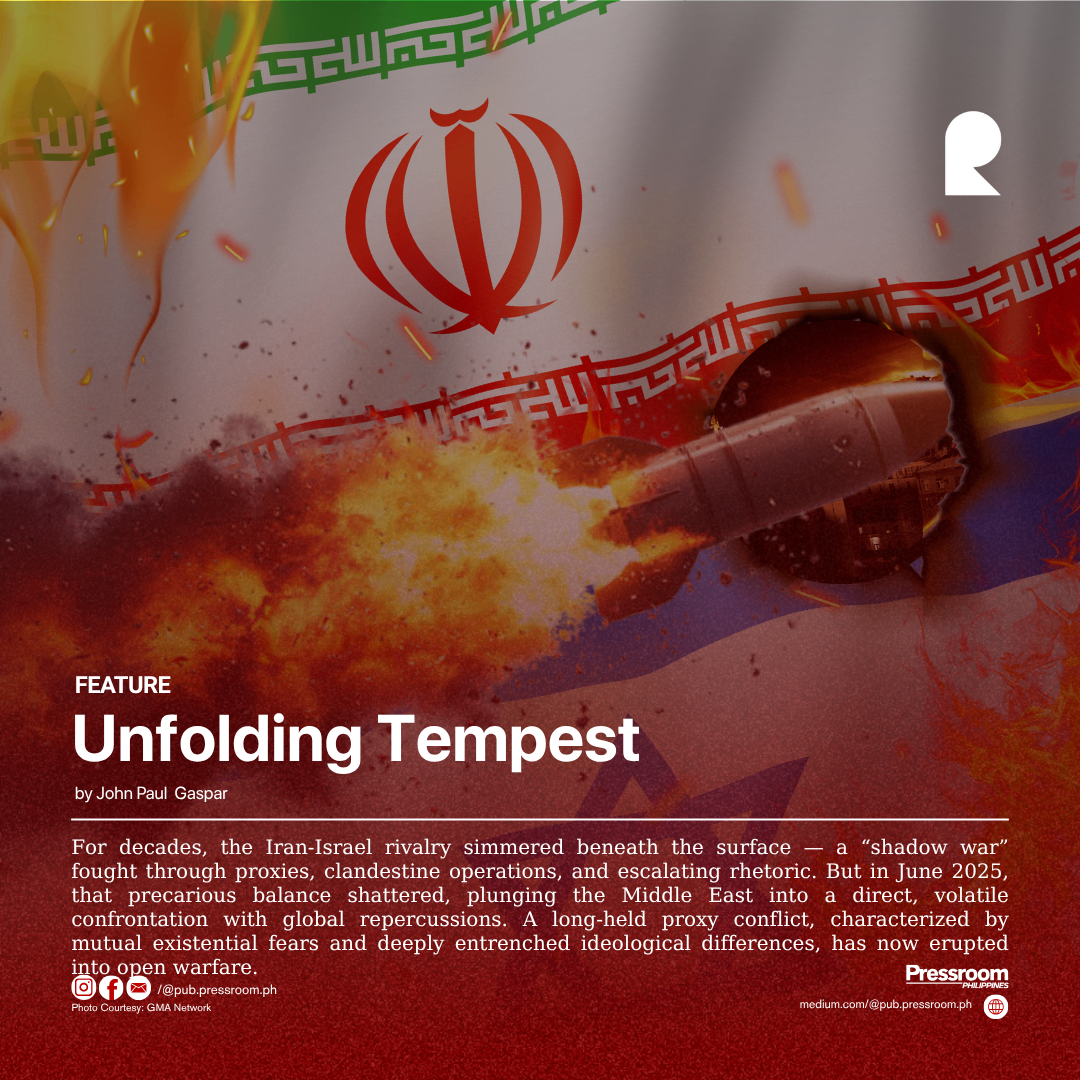
For decades, the Iran-Israel rivalry simmered beneath the surface — a “shadow war” fought through proxies, clandestine operations, and escalating rhetoric. But in June 2025, that precarious balance shattered, plunging the Middle East into a direct, volatile confrontation with global repercussions.

Kailan naging kasalanan ang pagiging kakaiba? Siyempre, sa matang mapanghusga. Nakakadena sa pang-aalipusta ang buhay ng isang naiiba. Iba sila kung tingnan at tratuhin, tila laging may layong paghusga. Pilit inaako ang bawat salitang nang-uuyam habang patuloy ang pagngiti — walang nakauunawa, walang pakialam.

Lahat tayo’y may kaniya-kaniyang pangarap na umaasang marating ang buhay na maginhawa— ‘yong tipong wala nang iniintinding bukas. Tila naglalayag sa alon ng karangyaan at ang isip natin ay malayang lumilipad, malayo sa problemang pinansyal.

Umibig ka na ba na parang tinola? Mainit, minsa'y mapait—ngunit sa bawat subo, may lambing na unti-unting gumuguhit sa panlasa. Hindi man agad tanggap ng lahat, natututo ka ring mahalin ang pait ng dahon ng sili at ang haplos ng malinamnam na sabaw.
.png)
Hindi tubig ang tunay na lumulunod sa kaniya—kundi ang paglimot ng sariling anak. Akala ng karamihan, likas na ang pagbaha tuwing tag-ulan. Sanay na raw tayo; sanay sa pagsalba ng TV gamit ang balde, sanay sa mga batang naliligo sa kalsadang maitim ang tubig.
.png)
They don’t tell you that the hardest part of grief isn’t the funeral — it’s the morning after. When the world is quiet, the bed is cold, and you wake up hoping it was all just a bad dream. But it isn’t. And that’s when the weight of loss truly begins.

College is often seen as a place where the best students receive awards and recognition. But what about those who study just as hard, give their all, and yet don’t graduate with Latin honors?

Sa Diyos ba’y ito’y kasalanan kung ang nagmamahalan ay magkaparehong kasarian? Kung oo, paano naging kasalanan ang kagustuhan ng Diyos para sa atin?